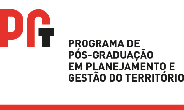Banca de QUALIFICAÇÃO: RODOLFO BAÊSSO MOURA
Uma banca de QUALIFICAÇÃO de DOUTORADO foi cadastrada pelo programa.STUDENT : RODOLFO BAÊSSO MOURA
DATE: 12/12/2022
TIME: 10:00
LOCAL: virtual
TITLE:
MAPPING OF SOCIO-ENVIRONMENTAL RISKS IN THE CONSTRUCTION OF TERRITORIAL (IN)JUSTICES: HISTORY, APPLICATIONS AND CONSEQUENCES
PAGES: 56
BIG AREA: Ciências Sociais Aplicadas
AREA: Planejamento Urbano e Regional
SUBÁREA: Métodos e Técnicas do Planejamento Urbano e Regional
SPECIALTY: Informação, Cadastro e Mapeamento
SUMMARY:
One of the outstanding characteristics of the Brazilian urbanization process is the spatial segregation of the population, where a portion enjoys most urban, public, and private services, and others are excluded from these territories. The excluded are responsible for occupying areas unsuitable for urbanization and environmentally fragile, such as rivers banks and steep slopes, which give rise to the so-called “risk areas”. More than 8 million people currently reside in areas at risk of floods, flash floods, and landslides in Brazil. This number demonstrates the way the national territory is occupied, where the most vulnerable have no choice but to huddle in complex and unsafe areas. Despite advances in understanding the need for a holistic approach, the vision centered on treating hazards permeates Brazilian risk and disaster management, where local practices that are building public policies are just over 30 years old. During this period, there were several methodological advances in the creation of technical instruments to support the theme. Among them, risk mapping stands out, which aims to identify homes at risk, grouping them into sectors identified by degrees of probability of an adverse event occurring. The elaboration of the mappings gained prominence after the approval of Law No. 12,608/12, guiding municipal governments to define intervention actions, including removals of homes in risk areas. Removals are a node of this discussion, as they can occur in an unnecessary, wrong, and unfair way. In this research, living at risk can be seen as a territorial injustice, essentially related to the socio-spatial segregation processes that it is the result of and the deterritorialization linked to questionable removals. This thesis intends to verify if it is possible to define in an academic investigation what would be the methodological, procedural, and application adaptations of the mappings (identification, analysis, and spatialization) of risks necessary for this technical instrument not to increase territorial injustices. Therefore, its main objective is to evaluate experiences and results of mapping socio-environmental risks applied in the Metropolitan Region of São Paulo, SP, and to propose methodological, and procedural changes and the use of this technical instrument to qualify the safety of territories, reducing one of the components of territorial injustices.
BANKING MEMBERS:
Presidente - Interno ao Programa - 1934619 - FERNANDO ROCHA NOGUEIRA
Membro Titular - Examinador(a) Interno ao Programa - 1790489 - LUCIANA RODRIGUES FAGNONI COSTA TRAVASSOS
Membro Titular - Examinador(a) Interno ao Programa - 1545979 - FRANCISCO DE ASSIS COMARU
Membro Titular - Examinador(a) Externo ao Programa - 2548506 - VITOR VIEIRA VASCONCELOS
Membro Suplente - Examinador(a) Interno ao Programa - 2563994 - RICARDO DE SOUSA MORETTI




